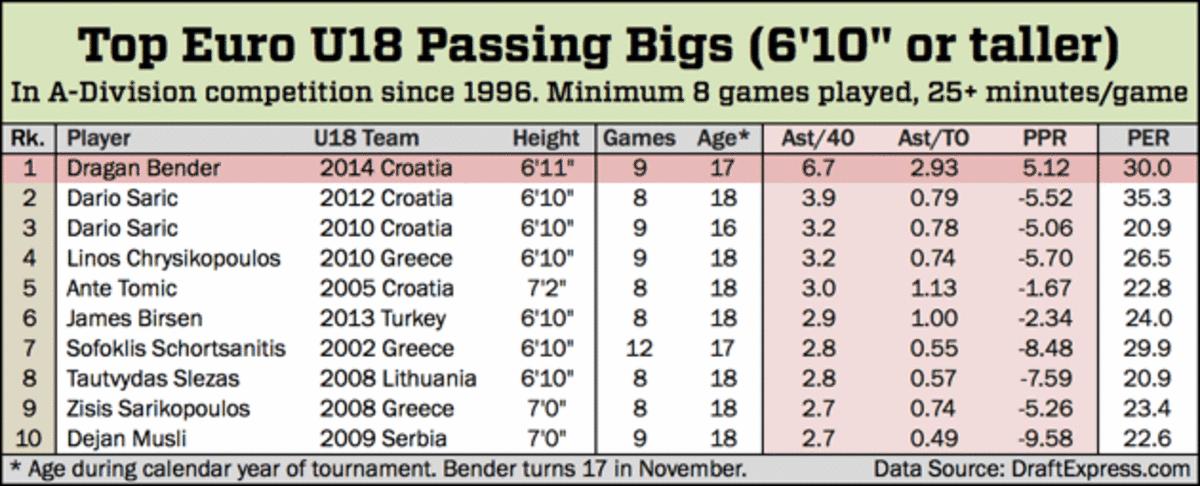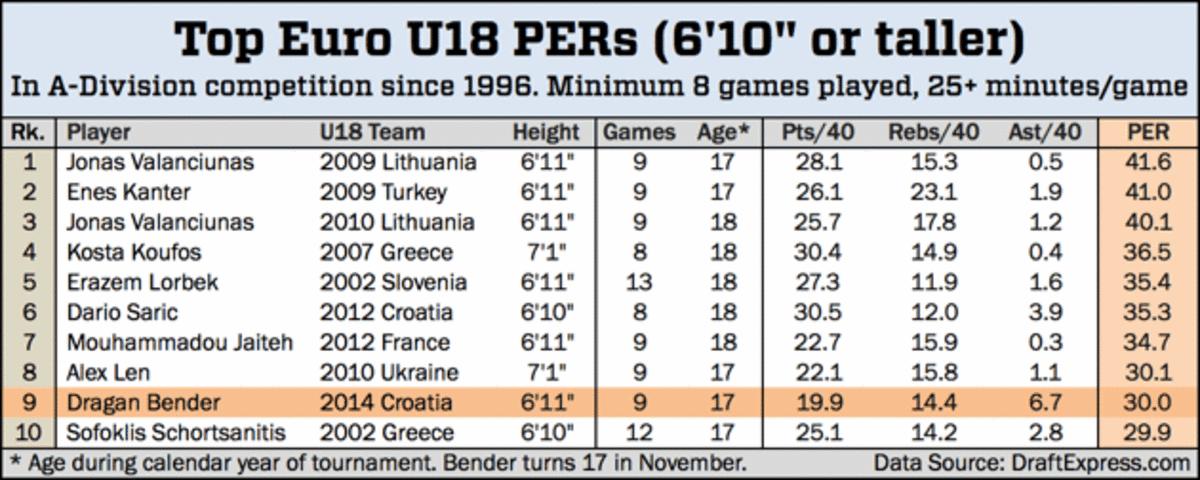Croatian phenom or Game of Thrones creation? Introducing Dragan Bender

KONYA, Turkey -- When the games ended each day at FIBA's U18 European Championship, the only bar to decamp to in this austere city of 1.1 million was an early closing, eight-stooler just off the lobby of the lone American-chain hotel, a Hilton Garden Inn; and you could mildly entertain yourself by sitting there, talking hoops, and reading the Tweets trickling in from Las Vegas. In the last days of every July, America's youth basketball elite -- AAU players and coaches, college recruiters and recruitniks -- descend upon the Western city whose moral compass best matches that of the sport's summer scene. The Las Vegas folks were 10 hours behind, so I could go to sleep while Twitter was buzzing about which college staffs were two- and three-deep in the bleachers for prize big men Thon Maker or Ivan Rabb, and wake up to Tweets being sent from nightclubs. The clock-and-culture contrast was disorienting.
The hunt for European prospects during the final week of July required a trek, as one Istanbulite described it to me, "to the center of Turkey, and the middle of nowhere." FIBA Europe staged its premier youth event of the summer -- the U18 Division A finals -- in a nation that's a burgeoning basketball hotbed, but also in that nation's most conservative Islamic metropolis. Konya is home to as many mosques as Istanbul despite being one-fifth of the size. The U18s opened during Ramadan, which meant a large majority of locals were fasting in the daytime, and most stores and restaurants were open only at night. And at night it was not exactly time to let loose: One evening when I walked with a few basketball scouts through town, we came upon nearly 100 police in full riot gear, arranged behind barricades near the edge of an outdoor bazaar. They were waiting in tense silence for some yet-to-manifest conflict. There had been pro-Palestine rallies in Istanbul and Konya in the previous days, in response to the bloody fighting with Israel, and while the police declined to explain if something was brewing, one of them did tell us to leave and "go back to your work."
Australian Ben Simmons takes unconvential path to top of '15 class
Our work was at the Konya Municipality Sports Complex, a brand new arena on a dusty development site a few miles east of the city's main tourist attraction, the mausoleum of 13th-century poet Rumi. The Sports Complex was a welcoming place, and it says something about the state of basketball in 2014 that you can walk into a gym in a far-off place and see familiar things: Division I college coaches in the stands, in shirts from St. John's and Gonzaga and Baylor and Miami, and more. Scouts from NBA teams, a month removed from a draft in which one-third of the first-rounders were born outside the U.S., took notes in leather-bound portfolios. The leading scorer was a capellini-thin Italian point guard named Federico Mussini, who said he was patterning his game off of Stephen Curry's, and you could see some similarities; the top per-minute rebounder was a Lithuanian, Domantas Sabonis, who is headed to Gonzaga -- and whose legendary father was a former Portland Trailblazer.
There was also that familiar, collective buzz in the gym, the same wide-eyed chatter that would accompany a mixtape-less prospect's breakout in Vegas: Basketball people were discovering a new phenom -- maybe. They were getting their first great look at The Dragonbender.
For a writer, the risk inherent in gushing about a tall young Eastern European prospect is that it could be Darko Redux, an easily linkable embarrassment for the rest of time. So I'm going to try to stick more to what I saw, and the context for what I saw, than what might happen in the future. I saw, while reviewing the U18 rosters online in advance of the tournament, that the second-youngest player in the field was a 6-foot-11 Croatian 16-year-old whose name (and obvious, ready-made nickname) seemed like a threat to Khaleesi: Dragan Bender.
On the second day of the tournament, I saw Bender -- playing against 17- and 18-year-old Lithuanians -- score 34 points, grab 14 rebounds, dish out two assists, block two shots, steal the ball twice and commit zero turnovers. He did all that in 29 minutes. In 2011, I saw Dario Saric, the Croatian who went 12th in 2014 NBA draft, excel as a 17-year-old in the U19 worlds; that was impressive, but this was even better. Among the college coaches, there was head-shaking disbelief and then, if they didn't arrive with the knowledge, dejection upon learning that Bender had signed a seven-year contract with Euroleague champions Maccabi Tel Aviv. "I've been to plenty of these tournaments, and never seen anything like that," one of the coaches said of Bender's 34.
[youtube:http://youtu.be/Qurn1LIowK0 width=630]
On the fifth day of the tournament, Bender had a near triple-double (21 points, 17 boards, nine assists) against Latvia. And on the final day, in the third-place game against Greece, he missed a triple-double by just one rebound (14 points, 10 assists, nine boards). He had three completely mediocre games in between those, but still finished as the tournament's leader in blocked shots, its third-best rebounder and also its third-best assist man -- a very rare combination. Bender had been recognized by scouts earlier in 2014 (at the Adidas EuroCamp and the Nike International Junior Tournament) mostly for being young and fluid and long, but in Konya he made the leap onto the NBA's radar.
I saw Bender do the following things in three live games. He used nimble footwork, patience, and his 7-1 wingspan to serve as a rim protector. When he grabbed rebounds, he had a Kevin-Love-like knack for immediately looking upcourt and making spectacular outlet passes. Bender's preferred style is the right-handed baseball pass, and he can throw it 50 feet, over the top of defenders, and hit teammates in stride for layups. He had a 2.9-to-1 assist/turnover ratio, and I saw him kill zones with passes from the high post, hit cutters from the wing, and actually execute a pocket pass as a pick-and-roll ballhandler. His feel for the game was excellent, and his ballhandling confidence was so good that Croatia actually used him -- at 6-11 -- to bring the ball up against full-court pressure. He preferred to start offensive possessions on the perimeter and was comfortable shooting threes or pull-up 15-footers, but he also scored with either hand in the post and dunked with either hand when he found a clear path to the basket.
Bender can already do a lot of things, but his passing, for his size, is what sets him apart. In FIBA U18 A Division competition since 1996, these are the top passing big men 6-10 or taller -- and you'll see that no one comes even close to Bender's assists per 40 minutes (6.7), assist/turnover ratio (2.9) or Pure Point Rating (5.12):

I also saw what Bender is not yet, at 16. He's not physical, either as a post defender, screener or finisher in traffic. He's not a scary shooter, even though he can make threes and likes to take them. He's not defined from a positional standpoint, hovering somewhere between power and small forward, which affects his projectability. He doesn't dominate every time out; in half of Croatia's games he deferred to older teammates. His inconsistency kept his tournament PER from hitting Jonas Valanciunas/Enes Kanter levels, but Bender still ranked in the top 10 in historical PER for players 6-11 or taller:

That chart includes four Lottery Picks, so it is, at the very least, promising company. Bender will first be eligible for the NBA draft in 2016 (or 2017, if the age limit changes to 20), and drafting him prior to 2018 will require paying a contract buyout to Maccabi. Who knows what will happen? If his development stalls, you may never see him stateside. If he continues on this trajectory, he's a Lottery Pick. At the moment, he's just a 16-year-old who, when I interviewed him in Konya, still had to carry the Croatian team's water bottles to the bus despite scoring 34 points. "What can I say?" the Dragonbender shrugged, grinning. "I am youngest. I must do this."
Bender was born in Čapljina, on the border of Bosnia and Herzegovina and Croatia, and grew up idolizing Toni Kukoc -- watching old videos of him from the NBA, Euroleague and Yugoslavian and Croatian national teams. "I love how he moved his body on the court so easy," Bender said "He is so smart as a player and always finds his teammates in better position with the extra assist."
Breaking down college basketball's top 25 recruits for 2014: Nos. 15-11
When Bender was 12, he and his older brother, Ivan -- who is expected to play for Maryland next season as a freshman -- began playing in the local academy of 6-11 Croatian legend Nikola Vujčić. The following year, the Benders moved to Split to enroll in Vujčić's academy full-time. Vujčić starred for Maccabi from 2002-08 and recently returned to the club in a management role -- and helped sign Bender for Maccabi's youth program. He signed for four years (starting in 2014-15) plus three years of options, and says he doesn't have a draft timetable as of yet; he first wants to play for Maccabi's senior team in Euroleague before thinking of the NBA.
Bender's Italian agent, Maurizio Balducci, was in the stands in Konya. Like a proud grandfather, he showed me video on his phone of Bender playing in a Croatian second-division game in December 2013, and then in another game in early 2014. The point was to show how quickly he was progressing -- from a young deer into someone who blew up at the U18s, midway through his 16-year-old summer. "This is a jewel in great hands [with Maccabi]," Balducci said. "This kind of talent is not normal."
Balducci argued to me that the three best prospects in all of Europe at the moment were Croatian: Saric, shooting guard Mario Hezonja and Bender. Croatia has spent decades trying (and failing) to find the next Kukoc, and maybe it never will, but in those three it has a chance to put itself back on the NBA map. Saric will be an asset to the Sixers when he arrives in 2-3 years, Hezonja is projected as the No. 6 pick in DraftExpress' 2015 mock, and Bender’s future is less defined. "I like to call him a noiser," Balducci said. "He makes the noise."
He has our attention, and now that sound can grow, sustain, or fade. Are near triple-doubles in Turkey the beginning of The Dragonbender legend? Or are they just noise?
